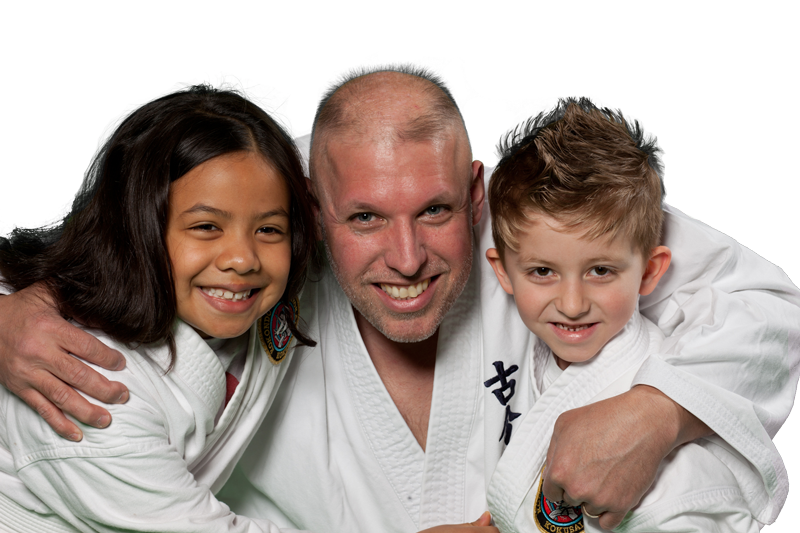FAQ
Frequently Asked Question
“If you are a potential student inquiring about our school, I want you to feel comfortable at the Jukido Jujutsu Dojo. Our philosophy is quite simple: “Do your absolute best!” To understand the commitment to yourself, you must understand your limitations physically. If you are restricted because of former knee or wrist injuries or have any other circumstances that may limit your ability to kick, strike, throw or falldown, it is extremely important that you inform us beforehand. Safety is very important to our training and students: that is the first lesson in Self-Defense”
Why did you select the Jukido Jujutsu Dojo?
Most new students are interested in martial arts for a specific reason. We want you to be absolutely certain that after researching other schools and programs that you chose the right dojo for you. In summary, we approach karate and jujutsu from a very classical and traditional way. Although many schools emphasize “sport” karate and “mixed martial arts”, we do not. We prepare students for practical self-defense.
What is the mood like?
The Jukido Jujutsu Dojo has a friendly and fun atmosphere. However, it is also a place of serious study, mindful of the martial arts tradition and purpose. The emphasis is on personal development through the comprehensive implementation of “muscle memory.” It is important to know we will be blueprinting a new set of movements into your mind. Techniques will be introduced, practiced, repeated, and reviewed many thousands of times.
How often should I train?
Classes at the dojo are offered several times per week. Attending twice is advantageous but three times is ideal. Although you can register for one class per week, we strongly encourage twice. Frequently, long gaps can slow the retention process and therefore discourage your preparation.
What should I wear?
It is important that you wear comfortable clothes that you can move freely in. Upon entering the dojo, remove shoes and socks. Neither is permitted on the training floor or mats. A tee shirt and sweat pants are best for beginners. Shorts are not recommended. Tee shirts should not have inappropriate messages or logos. Shortly after deciding you are going to commit to training, you will be required to purchase a gi (uniform). We use a white gi with no additional patches, colors or markings. A gi can be purchased from our school for your convenience.
Etiquette
Students should arrive in time to change and be on the mat at least 10 minutes before the class start time. Constant late attendance is rude and unacceptable. Parents, you are encouraged to get your child to the dojo within our established rules. Early is on-time and on-time is late! Drinking, eating and chewing gum are not allowed on the mat area. It is strictly enforced that personal hygiene is maintained. Students work closely with one another, so having a clean uniform, fingernails and toenails trimmed as well as fresh breath is respectful. Jewelry including necklaces and watches must be removed to ensure protection. When entering or leaving the mat or obtaining or leaving a partner, a bow is essential. This signifies our respect for each other and is also a formal declaration of our intention to train with safety.
What's all this bowing about?
Bowing is a gesture of kindness and respect for another person. Common among Eastern cultures, we have no real equivalent here in the West but a “hand-shake” may perhaps be best comparable. Bowing is a both a greeting and an acknowledgement of another person’s worth.
Is the Jukido Jujutsu Dojo suitable for women?
Yes. The techniques and the approach to training does not rely on muscle mass, large bone structure, or height. The techniques adapt to any body size and shape. A large muscular person will find they adapt to some parts of the syllabus more quickly. Similarly, small slight people will more readily pick up other skills. We aim to teach the complete Jukido Jujutsu syllabus to everyone.
When do you accept new students?
You can start anytime you wish.
Are there long term contracts to sign?
Absolutely Not! There is only monthly tuition.
How old do you have to be to train?
This depends on the child’s maturity and attention span, which can vary widely among individuals. The Jukido Jujutsu Dojo accepts children as young as 7 to begin. Special consideration for younger children may occur. Parents must understand that our dojo is NOT just another one of a parade of activities that mom and dad have ushered them through nor is it a babysitting clinic.
Will I get fitter because of practicing Jukido Jujutsu?
Yes, if you train regularly.
Do you have a grading system? If so, what is its purpose?
There is a grading system. Students will follow the grading syllabus. The system is in place to help students achieve balance in their training. Without a grading system, students tend to train to their strengths and neglect certain areas, which is detrimental to their future progression. Grading achieves a synergy between strength and weakness and enables students to retain information and techniques that they have learned in detail. It also ensures that there is consistency in the teaching standards. Strict adherence to the carefully conceived grading syllabus helps ensure that the highest standards are maintained across the many classes worldwide.
Can I fight in tournaments and competitions?
Our Jukido Jujutsu Dojo is primarily a school for self-defense and is not a “sport” competition martial art. Sport contest like cage fighting or MMA challenges are often more about the individual than the art. However, in Jukido Jujutsu, randori (free-fighting) is practiced with both partners trying to throw each other within a time limit. Ideally, it is drilled as training and learning exercise.

